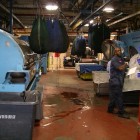AmeriPride
EPA Investigating Toxic Laundry Emissions In New England
|
The moment Mark Spiro walked into G&K Services, an industrial laundry in Waterbury, the steamy air stung his eyes and made his head ache. The place reeked of chemical solvents: methyl ethyl ketone, xylene, toluene – the sickly sweet scents of spray paint permanent markers and model glue. On that day in 2007, Spiro, an air pollution control engineer with Connecticut’s Department of Energy and Environmental Protection (DEEP), discovered high levels of volatile organic compounds (VOCs) pouring from G&K’s roof stacks, the result of laundering shop and print towels contaminated with toxic solvents, state records indicate. The state eventually sued G&K, won a $1.8 million settlement and stopped the facility from laundering shop and print towels in Connecticut. Laundering shop and print towels, which are cloths used to wipe oil, solvent and other chemicals off machinery can fuel the release of VOCs above federal limits. The use and processing of shop towels is largely under-regulated, despite its potential to emit toxic substances into the air. When the DEEP uncovered the chemical release violations at G&K, it alerted the U.S. Environmental Protection Agency, which launched its own investigation into all industrial laundries in New England.
